

BioexamWrapper. Information Competencies for Chemistry Undergraduates. How to read and understand a scientific paper: a guide for non-scientists. From vaccinations to climate change, getting science wrong has very real consequences.
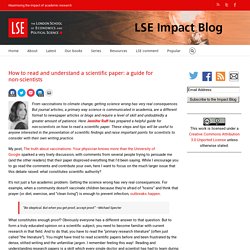
But journal articles, a primary way science is communicated in academia, are a different format to newspaper articles or blogs and require a level of skill and undoubtedly a greater amount of patience. Here Jennifer Raff has prepared a helpful guide for non-scientists on how to read a scientific paper. These steps and tips will be useful to anyone interested in the presentation of scientific findings and raise important points for scientists to consider with their own writing practice.
An Error Occurred Setting Your User Cookie. This site uses cookies to improve performance. If your browser does not accept cookies, you cannot view this site. Setting Your Browser to Accept Cookies. An Error Occurred Setting Your User Cookie. Psychology_study_that_induced_the_reproducibility_crisis_was_wrong. Craig Barritt/Getty Images for Cosmopolitan magazine and WME Live Remember that study that found that most psychology studies were wrong?
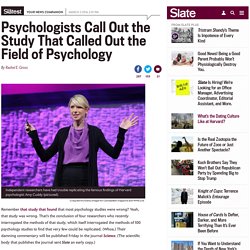
Yeah, that study was wrong. That’s the conclusion of four researchers who recently interrogated the methods of that study, which itself interrogated the methods of 100 psychology studies to find that very few could be replicated. (Whoa.) Their damning commentary will be published Friday in the journal Science. Koenig et al., 2012. Project 2061 - Science Literacy for All in the 21st Century. As the roles of science, mathematics, and technology grow in our society, the corresponding school curriculums must emphasize depth of knowledge, not breadth of information.
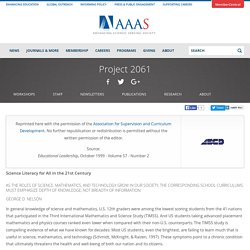
George D. Nelson In general knowledge of science and mathematics, U.S. 12th graders were among the lowest scoring students from the 41 nations that participated in the Third International Mathematics and Science Study (TIMSS). And US students taking advanced placement mathematics and physics courses ranked even lower when compared with their non-U.S. counterparts.
Engauge21st. Scientific Literacy. Scientific literacy is the knowledge and understanding of scientific concepts and processes required for personal decision making, participation in civic and cultural affairs, and economic productivity.
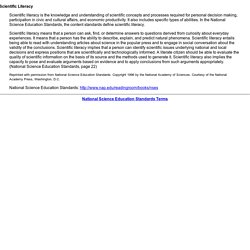
It also includes specific types of abilities. In the National Science Education Standards, the content standards define scientific literacy. Scientific literacy means that a person can ask, find, or determine answers to questions derived from curiosity about everyday experiences. It means that a person has the ability to describe, explain, and predict natural phenomena. PISA 2015 Assessment and Analytical Framework. A Cambridge professor on how to stop being so easily manipulated by misleading statistics. “There are three kinds of lies: Lies, damned lies, and statistics.”
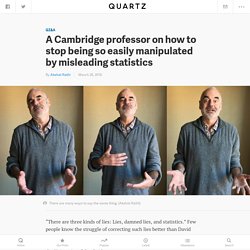
Few people know the struggle of correcting such lies better than David Spiegelhalter. Since 2007, he has been the Winton professor for the public understanding of risk (though he prefers “statistics” to “risk”) at the University of Cambridge. The danger of science denial - Michael Specter. Measles is a highly contagious respiratory disease caused by a virus.
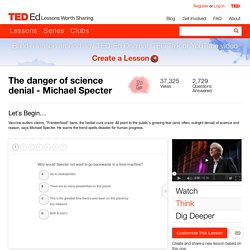
Autism is a neurodevelopmental disorder characterized by social impairments, cognitive impairments, communication difficulties, and repetitive behaviors. The Chernobyl disaster was a catastrophic nuclear accident that occurred on April 26, 1986 at the Chernobyl Nuclear Power Plant in Ukraine. Michael Specter has been a staff writer at The New Yorker since 1998 and is the author of Denialism, about how irrational thinking hinders scientific progress, harms the planet, and threatens our lives.
Infographic: How to read a scientific paper. Mastering this skill can help you excel at research, peer review – and writing your own papers.
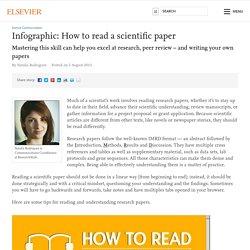
Science publishing: The paper is not sacred. Two months after we started a blog that tracks scientific retractions — Retraction Watch — in 2010, one of us (A.M.) told The New York Times that we weren't sure we would have enough material to post with any regularity.
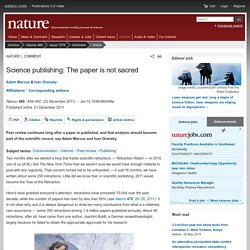
That concern turned out to be unfounded — in just 16 months, we have written about some 250 retractions. Little did we know that, in scientific publishing, 2011 would become the Year of the Retraction. Here's what grabbed everyone's attention: retractions have increased 15-fold over the past decade, while the number of papers has risen by less than 50% (see Nature 478, 26–28; 2011).
Visual Science - Map of Knowledge. To Know, but Not Understand: David Weinberger on Science and Big Data - David Weinberger. In an edited excerpt from his new book, Too Big to Know, David Weinberger explains how the massive amounts of data necessary to deal with complex phenomena exceed any single brain's ability to grasp, yet networked science rolls on.
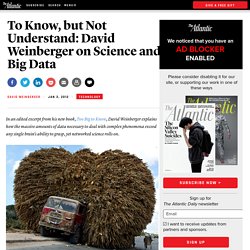
Thomas Jefferson and George Washington recorded daily weather observations, but they didn't record them hourly or by the minute. How to Conduct Scientific Research On the Internet (Without Getting Duped) As We May Think - Vannevar Bush. As Director of the Office of Scientific Research and Development, Dr.
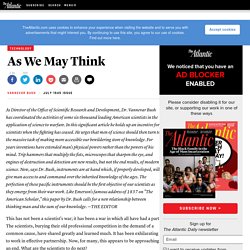
Vannevar Bush has coordinated the activities of some six thousand leading American scientists in the application of science to warfare. Who's downloading pirated papers? Everyone. Just as spring arrived last month in Iran, Meysam Rahimi sat down at his university computer and immediately ran into a problem: how to get the scientific papers he needed.